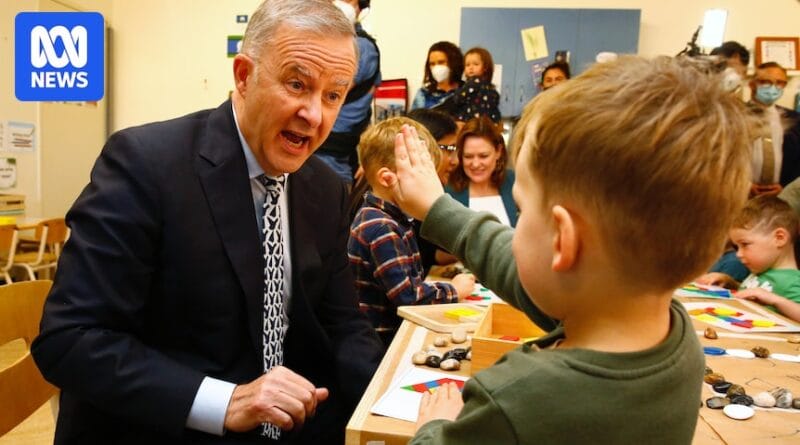Anthony Albanese will vow to scrap childcare activity test in family-focused election pitch
Anthony Albanese will pledge to scrap the activity test that dictates access to government childcare subsidies as part of a family-focused election pitch to be delivered on Wednesday.
Instead, every family earning less than $530,000 a year will be guaranteed access to at least three days of subsidised childcare a week if Labor is re-elected, according to a preview of the speech provided to the ABC.
Under the current scheme, parents are only eligible for subsidised childcare if they are working, volunteering, job hunting, on leave or studying for a certain number of hours per fortnight.
Abolishing the activity test was one of the recommendations set out by the Productivity Commission after the government asked them to investigate opportunities for improving childcare access and affordability.
The report, which was released in September, said children’s access to early education and care should not be dependent on their parent’s activity levels, that it was hurting families that need it most and wasn’t leading to “substantial” increases in workforce participation.
It also said all families with children under five who want to use early childhood education and care services should be able to access it for at least three days or 30 hours a week, 48 weeks a year.
“The only thing [the activity test] does is put extra weight on the shoulders of parents who are already doing the hard yards of looking for work while locking their children out of early education,” Mr Albanese will say on Wednesday.
“Too often, the children missing out on early education are the ones for whom it would make the biggest difference. Instead, by the time they start school, they’re already on the back foot.
“I know this for certain: parents do not need to work a certain number of hours a week to want the best possible education for their child.”
The prime minister will use the event in Brisbane to lay out Labor’s previously stated long-term goal for a universal early education and care system.
He will compare universal childcare to Medicare, compulsory superannuation and the National Disability Insurance Scheme, and state that “every child should have the right to quality, affordable early education”.
“We want to make sure that your decision isn’t dictated by where you live, or what you do for a living,” the speech reads.
“It’s driven by one thing only, what you want for your child.”
The scheme as it stands
Currently, the number of subsidised childcare hours a family can receive depends on the type of activity they are engaged in and the number of hours they spend doing it per fortnight.
For example, parents who work fewer than eight hours a fortnight receive no subsidies if they earn over $83,280 a year, while those who work full-time are entitled to 100 subsidised hours of childcare each fortnight.
Where the only activity is volunteering or looking for work, only the first 16 hours are counted, meaning they receive a maximum of 36 hours of subsidised childcare.
The number of subsidised childcare hours a family can receive currently depends on the number of hours they spend working, volunteering or searching for work a fortnight. (ABC News: Lucas Hill)
The Women’s Economic Equality Taskforce, set up to provide advice to the government about improving gender equality, also recommended the activity test be immediately scrapped in its report last year.
Consultancy firm Impact Economics and Policy has estimated that the test contributed to at least 126,000 children from the poorest households missing out on early childhood education, and scrapping it would see thousands of women join the workforce.
Angela Jackson, lead economist at Impact Economics and Policy, said the rationale for the test, that it would increase women’s workforce participation, was “flawed” as a lack of childcare limited women’s opportunities to search for work.
“If we’re moving towards a universal system, the first step really does need to be these kids that are currently missing out that have the most to benefit,” she said.
“When kids miss out on early childhood education and care that’s it, right? They start school behind and are likely to never catch up.”
She said scrapping the activity test was the “highest priority in terms of recognising that early childhood education and care can really lift the future productive capacity of those kids that get access”.





